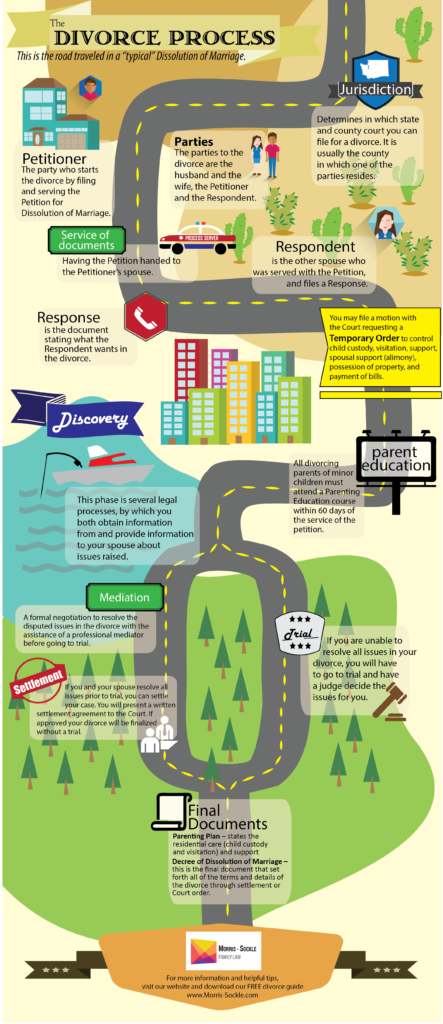Understanding the legal process
The legal process of divorce is difficult to navigate, especially if there are children and/or major assets involved. To maintain a sense of direction, you must identify your concerns and your goals. You will have the opportunity to make decisions impacting the parenting plan (custody and visitation) for your children, child support, spousal support, property possession, and debt division. You must familiarize yourself with the legal procedures, laws, court rules, and even special terminology. You need to maximize this opportunity. Divorce is a crossroads. It is an opportunity to create a new roadmap and direction for your future. Having an experienced lawyer on your side will help you lay the foundation for a better life after divorce.
Divorce in Washington
Jurisdiction: You can obtain a divorce in the Washington courts if either party in the case is a resident of Washington. However, if you have children, the location for initiating the legal action may be affected by where they live. Divorce laws vary from State to State. Divorce actions in the State of Washington are controlled by the Revised Code of Washington (RCW) 26.09. You can reference the statutes for technical information.
Washington is a “No-Fault” Divorce State. You do not need to prove that one of you is engaging in marital misconduct, such as an affair or abuse. It makes no difference to the court. In Washington, the only grounds for divorce is an Irretrievable Breakdown of the Marriage. You can get divorced just because you want to, and you cannot stop your spouse from going forward if they want a divorce. Washington uses the term Dissolution of Marriage for the process of terminating a marriage, but we will use the more common term “divorce” for easy understanding.
Even if you are not married, you may need help to deal with the details of ending a Committed Intimate Relationship. Washington law has provisions for treating the termination of committed intimate relationships very similarly to divorce, particularly in issues of parenting children and dividing property and debts.
- Petition for Dissolution of Marriage
- Service of Process
- Response to the Petition
- Temporary Orders
- Settlement Conference and/or Mediation
- Trial (if no agreement)
- Decree of Dissolution of Marriage
- Divorce Modification
Divorce Petition
The divorce process is started by one of the spouses filing a Petition for Dissolution of Marriage with the Court Clerk. The Petition states what the Petitioner wants for all issues of the divorce: custody, visitation, support, property possession, and debt division. This legal document must be correctly drafted, and filed in the Superior Court in the proper county, usually where the filing spouse resides, or
Response
The spouse being served with the Petition must then formally respond (answer) in writing to the information stated in the Petition where the children of the marriage are located.
Service of Process
A copy of the filed Petition for Dissolution of Marriage must be “served” upon (given to) the other spouse. This provides official notification to the other spouse that a legal action has been initiated. The service must be done by someone other than the Petitioner
Temporary Orders
The divorce cannot be finalized until the required 90-day Waiting Period has passed. During this period, the Court will enter Temporary Orders. These Court Orders control the temporary parenting plan (child custody and visitation), child support, spousal support, property possession, and debt division. Temporary Orders can also be used to restrain conduct and protect financial accounts. The divorce can be finalized after 90 days if the parties reach an agreement on all the issues involved in the divorce. Most cases take more than 90 days to reach an agreement or go to trial. The Temporary Orders will stay in effect until the divorce is finalized.
Agreement, Mediation, or Trial
If the parties reach an agreement on all the issues involved in the divorce and the proper documents are filed a Judge will order the marriage dissolved. If an agreement cannot be achieved, the court will schedule a Settlement Conference or order the parties to schedule a mediation session to assist in reaching a compromise agreement. If the parties are not able to agree to all the terms of the divorce, the court will schedule a trial.
Divorce Decree and Divorce Modification
At the end of the divorce proceedings, the Court will issue a Decree of Dissolution of Marriage. This document contains the final rulings of the Court regarding all the legal aspects of the divorce. Changing the terms of this decree is difficult and requires a formal Divorce Modification.
Most cases are settled by agreement within about six to nine months after filing the Petition. A trial, if necessary, will usually occur 12 to 18 months after the Petition was filed.












